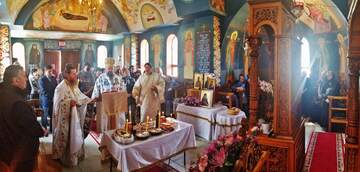 On the third Sunday of the Great Lent, the monastery of St. Demetrius the New enjoyed the visit of His Eminence Nicolae and of the many believers who crossed its threshold. Our shepherd wanted to strengthen us midway through the Great Lent, on the Sunday of the Holy Cross, and imparted with us some beautiful words of edification, from which we reproduce a few fragments. It was a beautiful celebration, and we thank the good God for the great gift He granted our brotherhood.
On the third Sunday of the Great Lent, the monastery of St. Demetrius the New enjoyed the visit of His Eminence Nicolae and of the many believers who crossed its threshold. Our shepherd wanted to strengthen us midway through the Great Lent, on the Sunday of the Holy Cross, and imparted with us some beautiful words of edification, from which we reproduce a few fragments. It was a beautiful celebration, and we thank the good God for the great gift He granted our brotherhood.

“Whoever desires to come after Me, let him deny himself, and take up his cross, and follow Me” (Mark 8.34). In these words of the Savior, we find first an exhortation to our freedom. “Whoever desires to come after Me”—right from the start, we marvel at God’s condescension. He came down from His glory and took on a human face, let Himself be crucified, died to pass through death to life, and yet does not force us to do anything. God, the One Who created man free, even in this work of redemption, of salvation, respects the freedom of man. And the first words of the Savior are a call to our freedom. If we want to be followers of Christ, we must complete the three stages he announces: “deny himself, take up his cross, and follow Me.” Deny ourselves. Why should God ask us to deny ourselves?! It does not mean giving up our talents, our personality, but putting aside precisely that which hinders our encounter with God, that which concerns our selfishness, that by which we do not allow God to come into our lives. To better understand what it means to deny ourselves, we must look to Christ Himself, who renounced Himself. If God came and emptied Himself and took on flesh to save us, how could we regain the “Image of God’s glory” if not by imitating God Himself, Christ become man? We must put aside all those things for which we care. We cannot wish to be saved—that is, gain communion with God, allow the light of the Godhead shine on our face—unless we imitate Christ. And we ought to let go of our selfishness, our passions, and empty ourselves of what fills us to make room for God. God cannot descend into our soul which is replete with all “our-ness.” We must empty our cup.
 “Let him take up his cross”—again, a heavy word especially if we remember that He said it not only to the disciples but also to the multitude. When he spoke to them, they all thought about what it meant to take up the cross, which then was a terrible punishment, a very painful punishment. But this cross does not mean that we be crucified. St. Paul explains it in two places: in Galatians: “And those who are Christ’s have crucified the flesh with its passions and all desires” (5.24). What was said about self-denial continues with the taking up of the cross. And in the Epistle to the Romans: “I beseech you therefore, brethren, by the mercies of God, that you present your bodies a living sacrifice, holy, acceptable to God, as your spiritual worship” (12.1). This is what it means to take up our cross, to present our body as a sacrifice to be sanctified, to become our spiritual worship to God. How appropriate are these words when we pray and fast and try to involve the body in a spiritual sacrifice! If we want to be followers of Christ, we must also go through these denials of ourselves, these crucifixions of passions and desires, and so reach the Resurrection, which is communion with God. And I would urge you to spend the four weeks of fasting with this concern, asking yourselves: What does it mean for me to become a Christian? Amen!
“Let him take up his cross”—again, a heavy word especially if we remember that He said it not only to the disciples but also to the multitude. When he spoke to them, they all thought about what it meant to take up the cross, which then was a terrible punishment, a very painful punishment. But this cross does not mean that we be crucified. St. Paul explains it in two places: in Galatians: “And those who are Christ’s have crucified the flesh with its passions and all desires” (5.24). What was said about self-denial continues with the taking up of the cross. And in the Epistle to the Romans: “I beseech you therefore, brethren, by the mercies of God, that you present your bodies a living sacrifice, holy, acceptable to God, as your spiritual worship” (12.1). This is what it means to take up our cross, to present our body as a sacrifice to be sanctified, to become our spiritual worship to God. How appropriate are these words when we pray and fast and try to involve the body in a spiritual sacrifice! If we want to be followers of Christ, we must also go through these denials of ourselves, these crucifixions of passions and desires, and so reach the Resurrection, which is communion with God. And I would urge you to spend the four weeks of fasting with this concern, asking yourselves: What does it mean for me to become a Christian? Amen!

